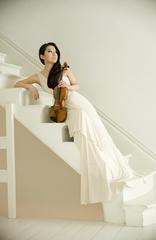|
Back
Bright Lights, Big City Houston
Jones Hall
10/02/2014 - and October 4*, 5, 2014
Karim Al-Zand: City Scenes
Samuel Barber: Violin Concerto, Op. 14
Aaron Copland: Symphony No. 3
Sarah Chang (violin)
Houston Symphony, Cristian Măcelaru (conductor) 
S. Chang (© Colin Bell)
A bold program of American music continued the Houston Symphony’s colorful season this weekend. Visiting conductor Christian Măcelaru, who has been building an impressive résumé, led vigorous, rhythmically assertive performances of the first and third works on the program and proved a sensitive accompanist in the Barber Violin Concerto.
Karim Al-Zand’s raucous City Scene was an excellent start to the program. The music is heavy with the sounds of 1920s Parisian and American jazz. The tart but never disorienting dissonances that permeate the score are limned in technicolor brass and percussion licks into which Măcelaru and the orchestra delightfully dug. The brief, quiet central section brought out Bartókian night-music sonorities, allowing the strings and wispy harp and percussion to provide a welcome moment of repose.
Above the musicians, a new photo collage of Houston’s various people- and landscapes by photographer/artist Libbie Masterson in collaboration with filmmaker Ford Gunter was projected. Their visual love letter to the city was beautiful and impressive, but was in constant competition with Al-Zand’s music. When sounds got louder and faster, so did the time-lapse images; when things in the music settled down, the visuals followed suit. What was missing was any creative, rhetorical counterpoint between sight and sound.
Nuance was also missing from Sarah Chang’s approach to Barber’s masterful Violin Concerto, a work relatively new to her repertoire. While she is without a doubt one of the great fiddlers working today, her playing seemed impatient and needlessly aggressive. There was an abundance of bow noise, not only in the “Presto” finale (as is to be expected), but also in the most lyrical moments of the first two movements. This was at the cost of a strong, singing tone that could carry over Barber’s resonant scoring, beautifully realized by the orchestra, and seemed to burden Chang’s execution of technical figures.
I don’t envy any conductor who has to lead Copland’s Third Symphony. The work is overly loud and overly high, with several moments in the score vying for Höhepunkt status. Several aspects of the structure—the straightforward ternary form of the scherzo and the return of the first movement’s main theme towards the end of the work—are convoluted and lack any teleological oomph. In all, it seems that Copland was struggling to fill an abstract symphonic model with the sonorities that worked so well for his programmatic “Americana” stage works.
Trying to step away from that admittedly personal view, there was much to enjoy in the evening’s rendition. Măcelaru’s starting tempo was steady and the orchestra’s playing full of nostalgia, reminiscent of Leonard Bernstein’s measured and intense 1985 recording, which has always seemed a lament to and celebration of his friend Copland’s achievements. The collective, chordal response to the opening melody’s bare octaves was perfectly balanced, one of many instances where Măcelaru brought a keen ear to Copland’s subtly dissonant harmonic language. Brass playing was spot-on and thrilling throughout. The trumpets are challenged again and again with stratospheric passages, and the section conquered each summit without fear. Softer brass solos from horn and trombone were played with sensitivity and excellent intonation, echoing the agile woodwind solos that pepper the score. The emergence of the Fanfare for the Common Man at the start of the finale was appropriately highlighted, and the movement’s build to its clangorous conclusion was expertly managed. In all, the reading was extraordinarily strong, conveying the work’s overtly epic tone and capitalizing on every opportunity for nuance in the score.
Marcus Karl Maroney
|